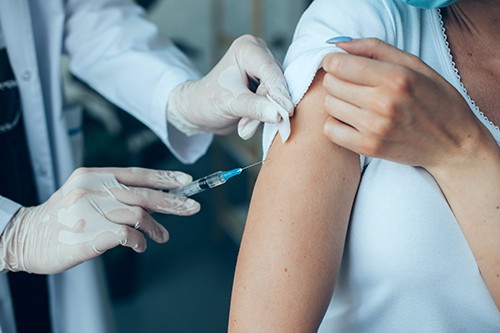What are immunizations and why are they so important?
Immunization is an important part of preventive care and community public health. The prevention of disease through inactive or live-attenuated vaccines is the best way to protect patients and keep our communities safe. It is essential for nurse practitioners to stay up-to-date on the latest immunization recommendations. This way, they can pass this knowledge on to patients, take a proactive approach to their health, and make sure they get the best care possible.
What is community or herd immunity?
Some patients will be hesitant to get immunized against diseases they have never heard of or seen. However, these are all diseases that used to be prevalent and no longer are due to herd immunity. Herd immunity is when enough percent of the population is immunized against a certain disease that the infectious agent is unlikely to have the opportunity to spread through a community. Therefore, unimmunized individuals have a degree of protection against a disease thanks to the prevalence of immunized people in their community.
One of the most important jobs of nurse practitioners in the primary prevention of Vaccine-Preventable Diseases (VPD) is to advocate that patients of all ages be offered immunizations in order to make sure community immunity continues to exist.
What percentage of people need to be immunized for herd immunity?
Herd immunity kicks in depending on how easily spread a disease is. For measles and pertussis, for example, around 95% of the population needs to be immunized in order for herd immunity to work. Mumps, which is not as contagious, requires about 80%. For COVID-19, infectious disease specialists initially thought 80% immunity would be enough, but the disease’s ability to adapt into variants has meant that number is actually still too low.
What is vaccine failure and how can Nurse Practitioners explain it to patients?
It happens that people who have been vaccinated against a disease will still contract it. People who do not want to get vaccinated may use this as justification why they “shouldn’t bother.” Nurse practitioners in the primary care setting likely hear this from patients every year. It is a common refrain regarding flu and COVID vaccines and boosters.
There are two types of vaccine failure. Primary vaccine failure, which is the cause in about 50% of these cases, occurs when the person’s immune system does not develop sufficient antibodies at the time of the immunization. This can be caused by using an antipyretic prior to vaccination (which is no longer recommended in any case) or persistent maternal antibodies in infant vaccinations.
Secondary vaccine failure accounts for the other half of cases and occurs when the patient’s antibody levels wane over time. This has been seen with COVID-19 and often depends on the specific vaccine as well as the patient’s immunocompetency. The occurrence of secondary vaccine failure is a strong reason why patients need to stay up-to-date with booster shots and re-vaccinations at the suggested intervals.
It is important for nurse practitioners to remind patients that while the COVID vaccine does not fully protect against getting the disease, it is highly effective against severe disease. The CDC has found that the risk of hospitalization and death increased tenfold in patients who were unvaccinated.
Related: Stay informed on the latest recommendations with our Adult Immunization Update.
What are some best practices for Primary Care Nurse Practitioners with regard to immunizations?
The responsibility of immunizing communities is very important for nurse practitioners. There are a few things NPs can do in their practice to help encourage immunization.
- Remove geographic and clinical barriers whenever possible
- Reach out to populations by providing immunizations at senior centers, schools, worksites, retail centers, and anywhere else your populations in need are located.
- When in doubt, re-immunize. It is always better to give an extra dose than none. The risk of reaction with re-immunization is minimal.
When should Nurse Practitioners recommend that patients defer immunizations?
Nurse practitioners know that immunization deferred equals immunization denied. It is always a goal of a primary care visit to make sure patients are up-to-date on their vaccinations. However, there are some cases when a patient needs to defer. The presence of a minor illness does not necessitate deferring or delaying immunization. Immunizations should be deferred with a moderate to severe illness. This may be with or without the presence of a fever.
A good rule of thumb is that any patient who can be treated as an out-patient (i.e. who does not need to be sent to the emergency department for their illness) should be considered a candidate for immunization.
What is the best way to convey immunization details to patients?
It is important for nurse practitioners to recognize that they have sway over people’s immunization decisions. Whenever possible, NPs should remove the question and make it easier for patients to agree to get immunized. For example, you can tell patients that vaccines are available rather than simply asking if they are interested in getting vaccinated. Patients will be more likely to agree and leave protected when the opportunity is stated rather than phrased as a question.
What vaccines are safe to administer during pregnancy and lactation?
Most vaccines are safe for both pregnant women and women who are in lactation. Getting vaccinated in these stages can provide health benefits to both the mother and child. The flu shot, Tdap, Hepatitis A, and Hepatitis B are all safe to use during pregnancy and lactation. While the Varicella vaccine is not safe for pregnant women, it is okay to use during lactation. This is because it is a live virus and could theoretically cross the placenta and infect the fetus.
Where can Nurse Practitioners get more information about immunizations?
The CDC releases annual reports and interim updates as recommended by the Advisory Committee on Immunization Practices. These are available at www.cdc.gov/vaccines/acip. It is essential for nurse practitioners in the primary care setting to keep up to date on this information. This allows them to keep patients properly immunized according to the best information available.
Stay informed and earn CE hours with our Adult Immunization Update online course (free with Passport Membership)!
This article was originally published on August 23, 2023.






